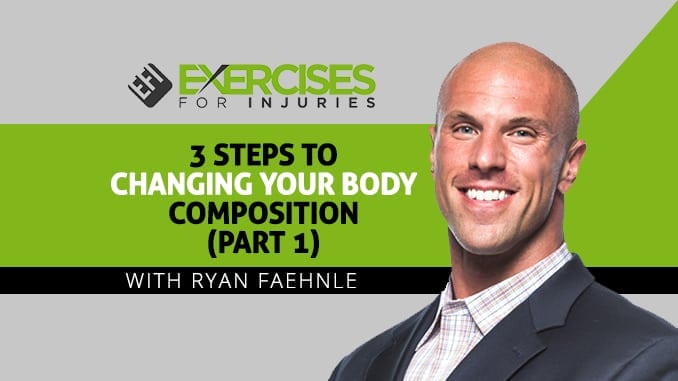
Last week, I did a fascinating interview with Ryan Faehnle. Ryan is a smart guy when it relates to body composition (your body shape).
Enjoy the interview.
Today, I have another interview for you with Ryan Faehnle. I will get Ryan to introduce himself, who he is, and what he does.
Ryan Faehnle: Hi Rick, my name is Ryan Faehnle. I know it’s a tough last name many people screw over. But right now, what I currently do is am a course conductor for the Poliquin Strength Institute. I travel internationally to lecture on fat loss training [¹], conditioning, injury prevention, and nutrition.
Before that, I served six years in the military, working with troops on their physical fitness to pass the performance test. And then I was also an NCAA Division I strength and conditioning coach for six years.
Rick Kaselj: Okay. You have done a lot of stuff.
Ryan Faehnle: Yes, quite a bit.
Rick Kaselj: What we are going to talk about on this call is body composition. Maybe you can give people a little bit of background. Like what body composition is and maybe go into the details of how people can change their body composition, mistakes people make, etc.
Definition of Body Composition
But maybe we will start with the basic definition of body composition.
Ryan Faehnle: That’s a very good question. It’s a question that confuses a lot of people. Many people use scale weights to determine how fat or thin they are. So they may say someone that is 270 lbs. is fatter than someone that’s 220 lbs. Well, that may be potentially true. It doesn’t take into account the composition of those pounds.
And what I mean by that is everyone has a certain number of different cells in their body. So you have muscle cells, bone cells, fat cells, and different organs, and those all make up the body’s composition. But typically, in the fitness industry, we refer to body composition as a percentage of body fat. For someone that has 10% body fat. It means that 10% of their total weight is fat while the other 90% is lean muscle tissues, bones, organs, etc.
Body composition is a much better tool to analyze health, well-being, and fitness than just bodyweight alone.
Rick Kasej: Okay. When we look at what people are looking at, like, fat loss or losing weight, they use the scale as a guide. But in reality, they are looking for shape changes or changes in their body.
Mistakes in Doing Body Composition
So what would be the number one mistake you see people make? When it comes to them wanting to change their body composition?
Ryan Faehnle: Okay, so I have to pick one mistake.
Rick Kaselj: Yes, just one. I know there’s a lot that you can go into. What would it be if people just listened to this part of the interview and left with this one thing?
Ryan Faehnle: One of the biggest mistakes that I think people make when it comes to changing their body composition is assuming that a calorie—> is a calorie —> is a calorie. And when we get into calorie counting. And it goes hand and hand with watching the weight on the scale. What ends up happening is, again, that you are neglecting what is happening to your body composition.
It is important to focus on proper nutrition rather than worry about calories.
When I talk about proper nutrition habits, I talk about things like eating plenty of whole-natural organic meats. Lots of vegetables, a little bit of fruit here and there. And things that happen in nature. Not a lot of processed food, not a lot of packaged foods. And things like that, not using the scale as a guide.
When you use the scale as a guide, what ends up happening is a very typical calorie counting as a guide mentality. Someone will eat low-calorie foods and maybe a low-calorie junk food, low-calorie pizza, or low-calorie ice cream; that’s fine. And what happens is they will start to lose weight on the scale, but a lot of times, when you eat those poor qualities of processed foods, you lose lean body mass or muscle mass. That becomes a problem because, over time, that causes your metabolism to slow down. It causes weakness in bone density, so that you could look at a future of osteoporosis, back problems, broken hips, and things like that.
As I said, a metabolic slowdown is another thing that happens when you focus too much on calories because the body doesn’t work in a linear exact mathematical equation. That’s what I think people need to understand and realize that it’s not simply about calories in versus calories out because there are things that come into play like hormones such as insulin and cortisol, growth hormones, all of those play a factor in what happens with your body composition.
Regarding reevaluating around, the biggest thing I could tell your customers and listeners here is to shift to whole, unprocessed organic foods and not worry about calories.
Eat When you are Hungry, Stop When you are Full.
It’s a simple rule of eating when you are hungry, stopping when you are full, as long as you are eating those naturally organic foods.
Here’s an example, how many times, Rick, have you ever heard someone say, “man, I was so stressed last night, and I couldn’t stop eating broccoli. I ate an entire bag of broccoli.” You don’t hear it because broccoli has something in it that is called fiber that causes you to fill up and have a feeling of fullness. It naturally regulates your calorie intake.
The same thing with protein; proteins naturally regulate your calorie intake because you get signals when you are full. Contrast that with chips, cookies, and donuts. Those things don’t have nutrients in them to signal you when you are full; that’s why you can tend to overeat those.
For your listeners, ensure you are eating whole, unprocessed foods as much as possible and eat organic as much as possible.
Rick Kaselj: One thing that you kind of quickly glanced over, and you mentioned that you should look at eating a little bit of fruit. What does that mean? And why should people think about eating a little bit of fruit?
Ryan Faehnle: Well, I say a little bit of fruit because people will tend to overdo fruits. If I give them the green light to eat fruits, what’s going to happen is they will eat a lot of their calories from fruits. And fruits do contain some sugar, and different fruits are different. Something like a berry has less sugar than a banana or watermelon.
But I like to say a little bit of fruit because it’s one of those nutrients that, even though it’s healthy and good for you, may not be the best to have in large quantity in a fat loss program, if that makes sense. So it’s healthy, but it may not be the right thing for fat loss.
Ditch calorie counting and start your journey to a healthier body composition by eating whole, unprocessed foods today! Check out our “Best Foods that Rapidly Slim & Heal in 7 Days” for more insights.
That is the end of part one. You can check out part two here.
Rick Kaselj, MS.



